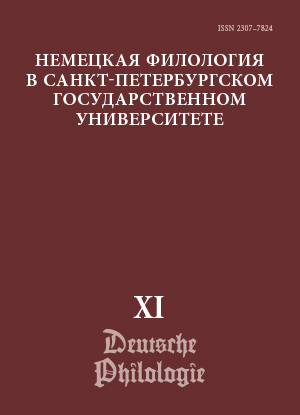The peculiarities of word formation structure of lexical units with the semantics ‘egoism’ in German and Russian
Abstract
The article considers German and Russian lexical units with the meaning ‘egoism’ that denote both a character trait and a person who possesses it. The research focuses on the peculiarities of their word formation structure, as well as, the particular features of their meaning. The study material is comprised of nouns and adjectives synonymous to der Egoismus ‘egoism’, der Egoist ‘egoist’, and egoistisch ‘egoistical’, and the examples of their usage in literature and periodicals. The introduction presents the etymology of der Egoismus and the definitions of this notion. The second part provides the word formative analysis of both German and Russian lexical units which helps to identify their characteristic structural features. The lexical units meaning ‘egoism’ are more numerous and various in German that can be attributed to its considerable word composition opportunities. The characteristic feature of this vocabulary is a large quantity of pronominal-component words, both in German and in Russian. The third part of the article describes the German neologism and occasionalism der Ichling ‘egoist’ and der Ichismus ‘individualism’ with the component ich — ‘I’, and the Russian word iachestvo with the component ia — ‘I’. The meaning of the analyzed abstract nouns does not correlate with the meaning of der Egoismus, despite of their structural similarity and component synonymy. Whereas unrecorded der Ichling, denoting a person in German, is a synonym to der Egoist that is proved by its usage. The novelty of the research lies in a comparative approach to the topic by appealing to unrecorded vocabulary.
Keywords:
word formation, word composition, derivation, borrowing, synonymy, pronouns, neologism, German language, Russian language
Downloads
References
Литература
References
Downloads
Published
How to Cite
Issue
Section
License
Условия передачи авторских прав на статьи и рецензии, опубликованные в ежегодном периодическом издании «Немецкая филология» регулируются условиями Лицензионного Договора автора с Санкт-Петербургским государственным университетом. В соответствии с Лицензионным Договором опубликованные материалы находятся в открытом доступе, а авторам бесплатно предоставляется неограниченные возможности их распространения и самостоятельного архивирования.




